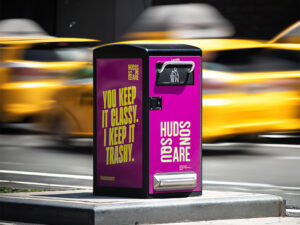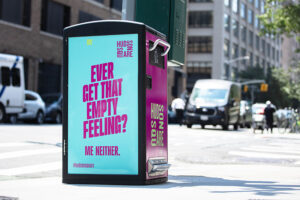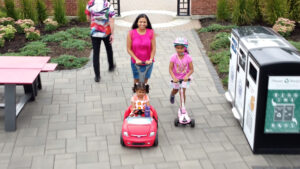By signing a contract with [Bigbelly] to provide up to 1,600 solar-powered trash compactors with wireless monitoring and companion recycling units, the City of Chicago has taken a major leap forward in transforming the way it manages public litter collection and a new recycling program in the downtown area. With its commitment announced this week to install the BigBelly intelligent waste collection system, the City will significantly reduce collection frequency and the related costs, truck traffic, fuel consumption and carbon emissions. The initial business-district deployment will consist of 400 BigBelly trash and recycling kiosks.
A summary of the Chicago Sun-Times Cover Story article follows, with links to read or download the entire article:
Chicago, IL – Garbage collection on the streets of downtown Chicago is going solar and high-tech, thanks to a $2.5 million purchase that could redefine the term “Big Belly.”
The Daley administration has signed a contract with Massachusetts-based BigBelly Solar to provide at least 400 solar-powered trash compactors in the central business district, where pedestrian traffic is heaviest and trash bins need frequent pickups.
Each unit holds five times the garbage of a normal trash can and has its own built-in sensor that alerts the city when it’s full. There’s also an attached container for recyclables.
“This initiative will help the city continue providing services during these difficult economic times with our more limited personnel resources,” Streets and Sanitation spokesman Matt Smith wrote in an e-mail response to the Sun-Times.
“Benefits are both economic and environmental. Since units are solar-powered, they don’t need an external power source. They compact the trash, so Streets and Sanitation makes fewer trips to empty them. … Trucks are out less, use less fuel and produce less emissions.”
BigBelly Solar bills itself as the “world’s first integrated” system that uses “renewable power and information technology” to dramatically reduce refuse collection costs.
One of 400 BigBelly Solar waste & recycling stations in Chicago’s system“The machine senses when trash reaches a certain level and triggers the compactor, which is powered by a solar-powered battery. There is also a separate container attached to the BigBelly that can accommodate recyclables,” Smith said.
“When the unit is full and needs emptying, it sends a notification to the city via an automated site. There is also a visible indicator on the machine to alert staff that it needs to be emptied.”
If the downtown experiment is half as successful as it’s been in Philadelphia, Chicago taxpayers could save a ton.
In 2009, Philadelphia was emptying the 700 conventional trash bins in its city center 17 times a week, with 33 employees working three shifts.
One year later — after installing 500 solar-powered compactors — collections had dropped to five times a week by nine employees working a single shift. That saved Philadelphia taxpayers $900,000 in the first year alone, company officials said.
“Wireless communications capability … allowed the city to better route and monitor vehicles and staff. Labor freed up by fewer required collections was used to staff the city’s expanding recycling program,” according to the company’s website.
Source & Reporting: Chicago Sun-Times



